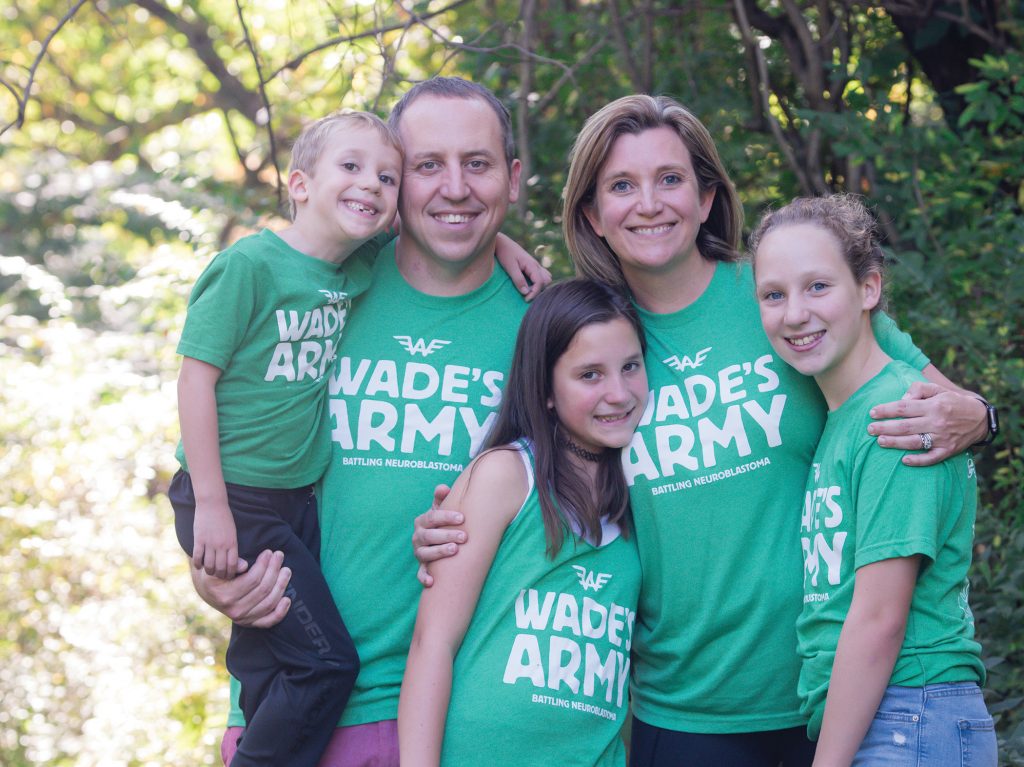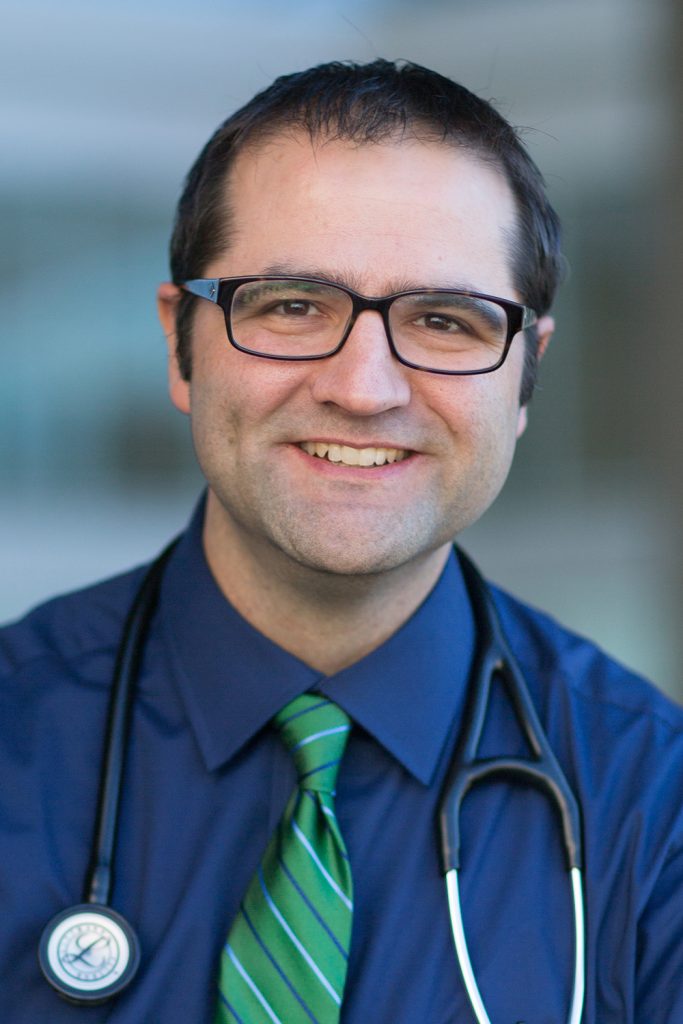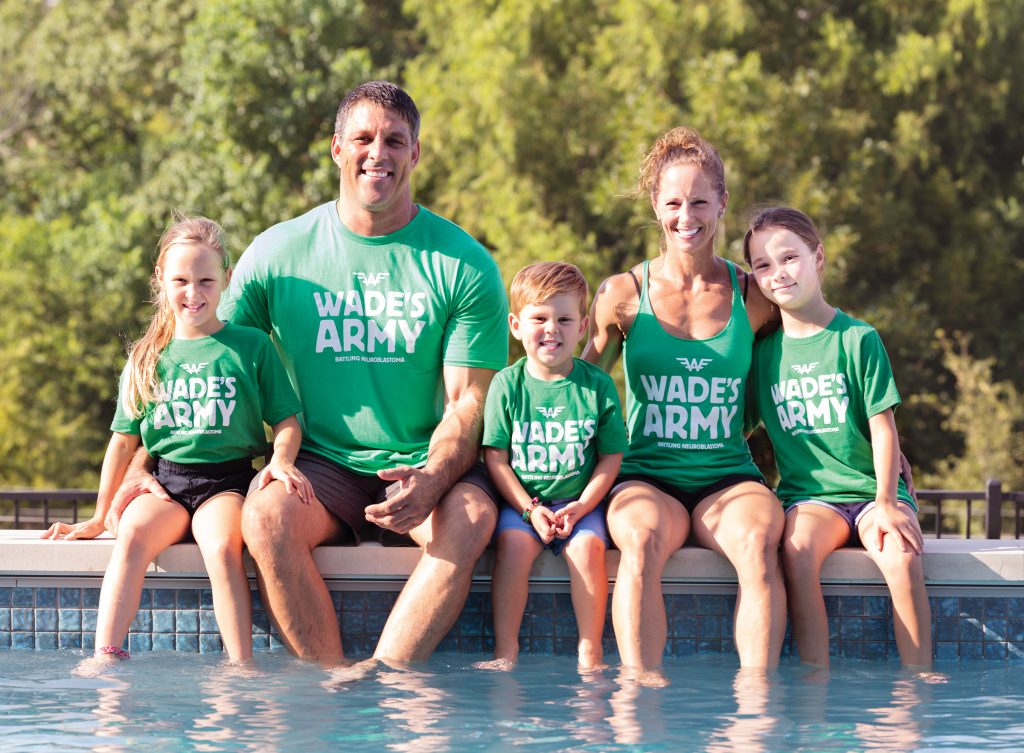For Heather and Scott DeBruin, their son Wade’s legacy is never forgotten. It’s in memories of his signature “unicorn” laugh; it’s in the face of his twin sister; and it’s in the support and generosity of a community of people who stepped up to help them when they needed it most.

Now the DeBruins, along with UNC alumna Kate Welbourn, whose maiden name was Shallcross, and her husband, John, a former player in the NFL, are looking to pave the way for other children and their families to find that same support and care in the wake of a neuroblastoma diagnosis.
Wade’s Army battles neuroblastoma
Wade’s Army, a nonprofit organization created by Wade’s parents and the Welbourns after his death in 2011, was designed to support families with needs related to a neuroblastoma diagnosis, as well as support research and science into finding a cure for the disease. The organization recently donated $200,000 to support the work of UNC Lineberger’s George Hucks, MD, a pediatric oncologist focused on neuroblastoma.
“In terms of pediatric cancer, neuroblastoma is one of the hardest to treat and most deadly,” Hucks said. “These patients get every treatment we know of, chemotherapy, radiation, surgery, immune-based antibody therapy, and despite all that, the cure rates are in the 50 to 60 percent range. If you relapse, it’s pretty much incurable.”
Both the DeBruins and the Welbourns were excited by Hucks’ neuroblastoma clinical trial because it was unlike other clinical trials for the disease. Hucks’ phase I trial uses chimeric antigen receptor T-cell (CAR-T) therapy to fight cancer using a patient’s own T-cells.
CAR-T therapy at UNC

UNC Lineberger is one of a select few academic medical centers in the United States that has the faculty and facilities to discover, design and deliver CAR-T therapy. The process involves collecting a patient’s T-cells, modifying them at the cancer center’s Good Manufacturing Practices certified Advanced Cellular Therapeutics Facility, and then reinfusing the modified T-cells into the patient. All this happens without the patient needing to leave Chapel Hill.
Heather DeBruin said the fact that CAR-T therapy can be done at UNC Lineberger without families having to travel is something that’s important to her.
“The idea of keeping treatment local is a big draw for me,” she said. “Without research centers close by, people have to travel, which not only costs a lot of money, but it’s lonely. North Carolina can serve all these different states, like South Carolina and Tennessee, so families don’t have to go through the anxiety and fear.”
Kate Welbourn was also enthusiastic about connecting with UNC, based on her school experience at Kenan-Flagler Business School. “I had three of the best years of my life at Carolina, and for me to give back to the Carolina community is really an honor.”
Diagnosis and treatment journey
For the DeBruins, their cancer journey started with a maternal instinct that something wasn’t right. Wade was 19 months old and had a low-grade fever that never completely subsided. After a few visits to the pediatrician, an ultrasound revealed that Wade had neuroblastoma, a cancer of the nerve cells that affects infants and young children.
At the time, the DeBruins were living in Evansville, Indiana, which didn’t have the resources to care for someone with Wade’s disease. His treatments took him first to Indianapolis, then the family decided to continue his treatment at Cincinnati Children’s Hospital Medical Center in Ohio — three hours from the family’s home and far from their family and friends.
Heather DeBruin chronicled their cancer journey online, since even a virtual connection with loved ones helped them cope. People started sending the family checks to help with the costs of Wade’s treatment, as well as care packages in the mail, something that made an impression on the family.
“When you have low days, support is so important,” Scott DeBruin said. “When you’re having a lousy day, just that small gesture can be enough to get you through.”
Building support

One person who wanted to support the family was Kate Welbourn. Pregnant with twins, the mom-to-be saw online that Heather, her high school soccer teammate and also mom of twins, had gone through something profound, and she wanted to help.
As a former offensive lineman in the NFL, John Welbourn had name recognition, and Kate wanted to capitalize on that to reach more people and spread awareness about neuroblastoma, with proceeds going to Wade’s Army. They started small — a T-shirt drive and a special workout in Wade’s honor. They raised $15,000 initially, then their efforts started to take off with every year that passed, raising $1 million over seven years.
Those funds allow Wade’s Army to offer families in need the same kind of support the DeBruins received during Wade’s cancer journey. And now, that money is going to fund critical research into neuroblastoma.
“A cure, obviously, would be the best result,” Scott DeBruin said. “Beyond that, our hope is with research like this we learn something material that will shape the next phase clinical trials or answer the important questions.”
UNC neuroblastoma clinical trial
With the phase I trial, Hucks is assessing the safety of the CAR-T therapy. Once the safety profile is established, the researchers will focus on determining a dosage minimum and then increase dosages during future trials to help with treatment plans for neuroblastoma patients.
“There are a lot of treatment options, but none is really effective,” Hucks said. “All children’s cancers are challenging, but this one is uniquely hard to treat and hard to cure, and the patients go through so much to achieve the cure when it does work.”
Hucks and his team hope to have 10-18 patients enrolled in the phase I trial, something the Wade’s Army gift helps ensure.
“The unique challenge of this trial is it’s costly,” Hucks said. “We’re not simply taking a drug and repurposing it for kids; this is a complicated procedure designed for each individual patient. It’s an expensive process. In order to do these trials, which we think are transformational in cancer care, we have to have the funds.”
Hucks said working with organizations like Wade’s Army is the best way to find patients and get the word out about the clinical trial. UNC Lineberger supporters have also been critical to making these connections through the Carolina community.
“We’d been looking for ways to back research, and we are committed to solving kids’ cancer, and asked for RFPs, how to treat it in a different way,” Kate Welbourn said. “My friend [and UNC Lineberger Board of Visitors member] Margaret Dean reached out to me and connected us with UNC’s program.”
“Partnerships are important,” Hucks said. “The more parent-led groups we can partner with, that’s how the battle is going to be won.”
